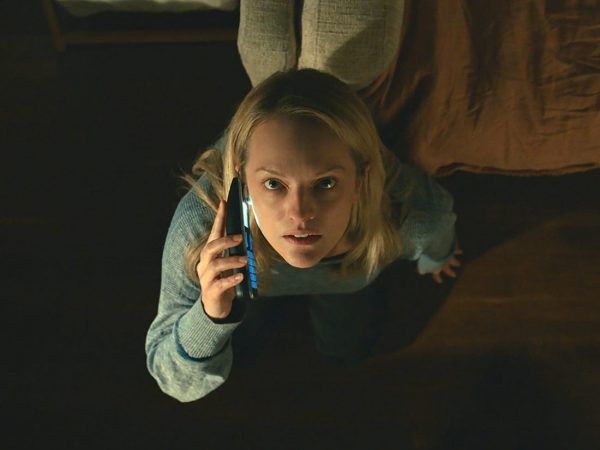I miss the hell out of a movie theater, man. I mean, I miss a lot of things. Hugging my friends. Being blissfully unaware that the POTUS has a social media presence. Not wondering if this trip to the store to buy bread will be the one where I bring home the bug that'll kill my grandparents. We're living in an aggressively un-chill timeline, and there are issues vastly more important going on than whether or not I can struggle to hear Tenet in a theater, issues of civil unrest and racial injustice and political fractionization that make even an IMAX screen seem small. But it's my job to filter the muck through a pop culture lense, and the longer the COVID pandemic keeps patrons from safely returning to theaters, the clearer it becomes that all we've been robbed of during the absolute crap-storm of 2020 can be embodied by our inability to catch a flick whenever we feel like it. I miss the hell out of a theater because I miss the hell out of people, and the two things are indelibly linked in my mind.
But that's not quite it, either. It's so easy to say that we miss movie theaters because we miss community, but you can say the same for so many things. Restaurants. Bars. Laser tag arenas. All the normal go-to spots we took for granted. But there's something decidedly more to sharing a movie with a room full of people, as opposed to a meal or a few drinks. It's an experience that links you to a stranger because you're not just sharing a thing, you're sharing an emotion. I think often of what Roger Ebert wrote about a film's unique ability to bond.
"Movies are the most powerful empathy machine in all the arts. When I go to a great movie I can live somebody else's life for a while. I can walk in somebody else's shoes. I can see what it feels like to be a member of a different gender, a different race, a different economic class, to live in a different time, to have a different belief."
It's that electrical current that moves from person to person that I miss. It doesn't always happen, but when it does, it's magic. Even recent examples; I think about the audible sobs that filled the room for a full 60 minutes after A Star Is Born cut to credits. The third act of Avengers: Endgame that transformed the El Capitan Theatre on Hollywood Boulevard into a rock concert. The gasp of realization that turned into straight-up screams during that restaurant scene in The Invisible Man. Even quiet moments, moments without sound. The unexplainable but potent feeling that everyone around you had goosebumps when Miles Morales hung upside-down above Manhattan in Spider-Man: Into the Spider-Verse.
The funny thing is I can watch all of these movies right now at home, and with more and more titles taking the VOD route, it's becoming common to catch new releases at home. This isn't a bad thing. Not every theater trip is a perfect one—the only conspiracy theory I believe is that move snacks have somehow gotten louder—and lord knows sometimes you just wanna' watch a dang move on a couch. I've discovered movies I love during quarantine—watch Bill and Ted Face the Music immediately if you need an injection of joy—but there's a hole in the process that I can't quite shake. Experiencing a truly great movie for the first time by yourself is like bungee jumping alone off an abandoned bridge, a rush of pure adrenalin with nowhere to go.
When you lose that shared experience, you also lose an element of immersion. If we're being truly honest here—and why not, it's 2020, over-sharing means nothing—I found out I had ADHD at 24 years old, which immediately explained why plot points and character names often whizzed past me like cars on a freeway. Because my brain is put together like an IKEA desk that fell off the truck, watching a movie at home is like watching it at a distance. Listening to it from around a corner. Watching a movie in a theater, however, is watching it on the movie's terms. I've been thinking a lot of a conversation I once had with, of all freaking people, Terry Gilliam, one of the first interviews I ever conducted. It was 2014, and although life (and, to be honest, Terry Gilliam's reputation) has changed innumerably in the time since, one tidbit still rings in my head.
“You went to the cinema before, and it had a sense of respect and worship...You went into the ‘temple,’ and there was this great overpowering image that was bigger than you. You were a small part of the crowd. Now, with your iPhone, you dominate it. You are a giant, peering into this small world. And that gives you power, but it also distances you.”
That comes right up to the line of something I want to avoid, which is deifying the theatrical experience too much. People still text too much in the theater, seats are still roughly the same level of sticky as a flytrap, and being free to buy a 14-gallon Diet Coke and see Mulan isn't going to fix the immensely more important issues plaguing America. But in the middle of upheaval, it's okay to miss a simple pleasure and okay to define your own safe haven. Just because you're busy trying to keep your ship from capsizing doesn't mean you can't also yearn for the sight of a lighthouse.
By the time this piece publishes, some theaters will have re-opened, and scores of patrons will have deemed it safe to return. Again, that's okay, as long as you've done your research and weighed the risks beyond "because I want to." I'm not demanding you stay home. I'm just saying that I'm staying home and while I do, I'm dreaming of the theater. No masks. No spray. No tension. A technicolor microcosm of the world at its best.
[For the complete, opposite take, here is my colleague Allie Gemmill's thoughtful explanation of why they are never going back to the theater.]



